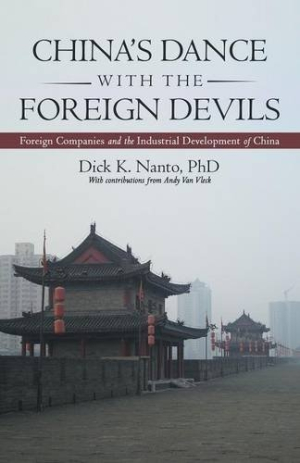China's Dance with the Foreign Devils
Foreign Companies and the Industrial Development of China
Impressive in its scope and thoroughness, this work is an expert’s view of the growth of China as a global power.
China’s Dance with the Foreign Devils by Dick Nanto is clear, authoritative reportage on the rise of the Chinese economy.
China has become one of the world’s largest, most robust economies. But the story behind that rise, particularly how it relates to the investments of and relationships with other countries, may not be well known. Dick Nanto, a retired economist who analyzed the economies of China, Japan, and Korea for the United States Congress, offers a uniquely informed perspective on this aspect of China’s hyper-successful economy.
A book that is both eminently readable and thoroughly researched, China’s Dance with the Foreign Devils discusses in detail foreign direct investment (FDI) which, writes Nanto, “has had a disproportionate impact on the industrial development of China.” Nanto traces how China evolved into an industrial power through Mao and post-Mao times, offering a fascinating glimpse of a country in the midst of both reform and revolution.
Interestingly, the first “foreigners” who had a major impact on the country’s economic way of life “were primarily ethnic Chinese who had left the country and become industrialists” in other Asian countries, according to Nanto. These individuals literally brought back capitalism when they returned to China to seek more growth opportunities.
Still, China’s uneasy relationship with other “foreign devils” such as the United States, Australia, and Europe is the real story here. The author provides real insight into how Chinese officials almost begrudgingly allow FDI into the country, yet restrict it at the same time. With keen insider knowledge, Nanto also assesses the contentious relationship between the People’s Republic of China and Taiwan. Just as intriguing is China’s more recent global pursuit of “outward direct investment” in other countries.
In the end, Nanto concludes that “foreign direct investment in China was the key that unlocked economic growth and triggered changes in government policy that enabled the country to modernize.” The author notes that, despite a history of taking advantage of “foreign devils,” China is now “developing into more of a partner than just a cheap platform to manufacture things.” This is likely to make the country more prominent as an innovator in its own right as Chinese companies and foreign companies alike struggle to meet the demands of its huge populace.
The strength of this book is the author’s expert ability to tell the story of China’s growth clearly and comprehensively, while supporting the text with a wealth of figures, tables, and referenced sources. Nanto’s firsthand knowledge of the country, its government, and its economy lends credibility to a work that is impressive in its scope and thoroughness. Seeing the development of China as a global economic power through the eyes of Dick Nanto is likely to give every reader a deeper understanding of China and its role in the world.
Reviewed by
Barry Silverstein
Disclosure: This article is not an endorsement, but a review. The publisher of this book provided free copies of the book and paid a small fee to have their book reviewed by a professional reviewer. Foreword Reviews and Clarion Reviews make no guarantee that the publisher will receive a positive review. Foreword Magazine, Inc. is disclosing this in accordance with the Federal Trade Commission’s 16 CFR, Part 255.

